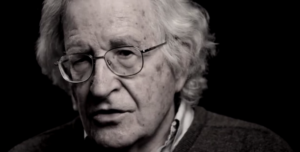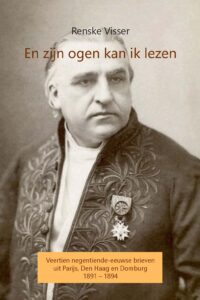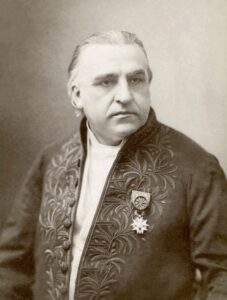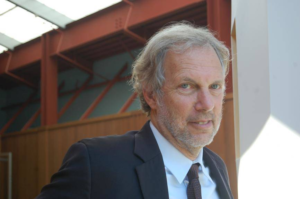Chomsky: US Must Join Global Call For Negotiations As Russia Escalates Actions
The war in Ukraine has taken a dramatic turn for the worse. Putting to rest his own ludicrous claim that the invasion of Ukraine constitutes a “special military operation,” Russian President Vladimir Putin has ordered a military call-up and staged “referendums” — votes to join Russia — have been conducted in the occupied territories. Meanwhile, there are calls for more weapons from Ukrainian President Volodymyr Zelenskyy and even demands that Russia be removed from the United Nations Security Council. The political and military ramifications of these developments are profoundly disturbing, says Noam Chomsky in an exclusive interview for Truthout. They indicate “a plan for a long-drawn-out war of attrition.” Chomsky urges that the U.S. join the rest of the world in calling for negotiations, not because Putin can be trusted, but because negotiations are our best hope for averting disaster. There’s no certainty as to whether this process would result in peace, but as Chomsky says, “There is one and only one way to find out: Try.”
Chomsky is institute professor emeritus in the department of linguistics and philosophy at MIT and laureate professor of linguistics and Agnese Nelms Haury Chair in the Program in Environment and Social Justice at the University of Arizona. One of the world’s most-cited scholars and a public intellectual regarded by millions of people as a national and international treasure, Chomsky has published more than 150 books in linguistics, political and social thought, political economy, media studies, U.S. foreign policy and world affairs. His latest books are The Secrets of Words (with Andrea Moro; MIT Press, 2022); The Withdrawal: Iraq, Libya, Afghanistan, and the Fragility of U.S. Power (with Vijay Prashad; The New Press, 2022); and The Precipice: Neoliberalism, the Pandemic and the Urgent Need for Social Change (with C.J. Polychroniou; Haymarket Books, 2021).
C.J. Polychroniou: Seven months after Putin’s criminal invasion of Ukraine, the war has reached a turning point. It has come home to Russia with Putin’s call for “partial mobilization,” and annexation referendums have been staged. What does the bolstering of Russian forces in Ukraine mean for Russia and Ukraine? Are Putin’s orders for military call-up an admission that Russia is no longer conducting a “special military operation” in Ukraine?
Noam Chomsky: What has come home to Russia is unclear. There are reports of protests and forced conscription, alongside of appeals to defend Mother Russia from yet another Western invasion, which, like those [going] back to Napoleon, will be crushed. Such appeals might have resonance. Historical memories may be deep. What the outcome will be we can only guess.
From the first day, it was a criminal invasion, never a “special military operation,” but the pretense in the Kremlin is still maintained. The mobilization is unlikely to have much effect on the war for some time to come, and what kind of effect is unclear. The failures and incompetence of the Russian military have been a continuing surprise to most well-placed analysts. That may well extend to mobilization, training and supply of equipment. Any meaningful bolstering of Russian forces from these efforts is likely to be well ahead, probably after the winter months. I suppose Russia could move forces from other regions, but whether the leadership has the capability or will to do that, I don’t know.
The mobilization and referenda seem to indicate a plan for a long, drawn-out war of attrition. If the mobilization does succeed in shifting the tide of the war, that increases the risks of inducing the West to up the ante with more advanced weapons, perhaps reaching to Russia itself as President Zelenskyy has requested, so far rebuffed. It’s not hard to envision scenarios that lead on to catastrophic consequences.
That’s just the beginning. The impact of the war goes far beyond: to the millions facing starvation with the curtailing of grain and fertilizer exports, now partially relieved though there is little information about how much; and most important of all and least discussed, the sharp reversal of the limited international efforts to address the looming climate crisis, a colossal crime against humanity.
While huge resources are being wasted in destruction and the fossil fuel industries are gleefully celebrating the opening up of new fields for exploitation to poison the atmosphere even more, scientists are regularly informing us that their dire warnings have been far too conservative. Thus we have recently learned that the Middle East region, not far away from embattled Ukraine, is heating almost twice as fast as the rest of the world, with an estimated 9ºF rise by the end of the century, and that sea levels in the Eastern Mediterranean are expected to rise a meter by mid-century and up to 2.5 meters by 2100. Of course it doesn’t stop there. The consequences are almost impossible to envision.
Meanwhile the region continues to be the global center for heating the world to the brink of survivability and soon beyond. And while Israel and Lebanon may soon be sinking into the sea, they are squabbling about which will have the honor of virtually destroying both of them by producing the fossil fuels at their maritime borders, acts of lunacy duplicated around the world. Escalating the war in Ukraine in the face of such realities reaches levels of imbecility that are hard to capture in words. Read more
Chomsky: The US And Israel Are Standing In The Way Of Iran Nuclear Agreement
During the first few decades of the post-war era, the U.S. considered Iran one of its closest geostrategic allies, especially after the CIA overthrew Iran’s democratically elected government in 1953 and restored Mohammad Reza Pahlavi as Iran’s leader. However, since the 1979 revolution, which abolished the monarchy and established an Islamic republic, the U.S. and Iran have been mortal enemies, largely due to the role that Israel occupies in the region. In this context, during the last couple of decades, the thorniest issue in the U.S.-Iran relationship has been Tehran’s nuclear program, which, Iran says, is focused on energy, not weapons. Israel has been adamantly opposed to the program, even though it is accepted beyond dispute that Israel itself is a nuclear power. In 2015, Iran and several other countries, including the United States, reached the Joint Comprehensive Plan of Action agreement, according to which Iran was willing to dismantle much of its nuclear program and open its facilities to nuclear inspections in exchange for billions of dollars of relief support. However, the Trump administration withdrew U.S. support from the agreement — and Israel continued its policy of sabotage and assassination of scientists.
Current talks between Washington and Tehran’s rulers to restore the 2015 nuclear agreement have been stalled, and there is little hope that progress will be made any time soon. Naturally, the U.S. places the blame on Tehran. However, U.S. propaganda grossly distorts the reality of the situation, Noam Chomsky points out in this exclusive interview for Truthout. The barriers to diplomacy are none other than Israel and the United States, says Chomsky.
C.J. Polychroniou: Noam, the U.S. and Iran are at odds with each other, having difficulty even talking to each other. Why do they hate each other so much, and how much of a role does Israel’s shadow play in this continuous drama?
Noam Chomsky: At the risk of sounding like a broken record, I’d like to say a few words, once again, on why I feel that the entire framework in which this issue is discussed is seriously distorted — yet another tribute to the enormous power of the U.S. propaganda system.
The U.S. government has been telling us for years that Iranian nuclear programs are one of the gravest threats to world peace. Israeli authorities have made it clear that they will not tolerate this danger. The U.S. and Israel have acted violently to overcome this grave threat: cyberwar and sabotage (which the Pentagon regards as aggression that merits violence in self-defense), numerous assassinations of Iranian scientists, constant threats of use of force (“all options are open”) in violation of international law (and if anyone were to care, the U.S. Constitution).
Evidently, it is regarded as a most serious issue. If so, we surely want to see whether there is some way to lay it to rest. There is: Establish a nuclear weapons-free zone (NWFZ) in the Middle East, with inspections — which, we know, can work very well. Even U.S. intelligence agrees that before the U.S. dismantled the joint agreement on nuclear weapons (JCPOA), international inspections of Iran’s nuclear program were successful.
That would solve the alleged problem of Iranian nuclear programs, ending the serious threat of war. What then is the barrier?
Not the Arab states, which have been actively demanding this for decades. Not Iran, which supports the measure. Not the Global South — G-77, 134 “developing nations,” most of the world — which strongly supports it. Not Europe, which has posed no objections.
The barrier is the usual two outliers: the U.S. and Israel.
There are various pretexts, which we may ignore. The reasons are known to all: The U.S. will not allow the enormous Israeli nuclear arsenal, the only one in the region, to be subject to international inspection.
In fact, the U.S. does not officially recognize that Israel has nuclear weapons, though of course it is not in doubt. The reason, presumably, is that to do so would invoke U.S. law, which, arguably, would render the massive U.S. aid flow to Israel illegal — a door that few want to open. Read more
Noam Chomsky: The War In Ukraine Has Entered A New Phase
Seven months on, the war in Ukraine has entered a new phase. Ukrainian forces are running a counteroffensive in the east and south regions of the country while Russia is still bent on annexation plans. Meanwhile, the West, with the U.S. at the forefront, continues with its explicitly stated strategy of weakening Russia to the point of regime collapse, thereby leaving no room for negotiations. All these developments indicate that peace remains distant in Ukraine and that the war may in fact be poised to become even more violent. Worse, argues Noam Chomsky below in an exclusive interview for Truthout, congressional hawks are increasing the risk of terminal war with the Taiwan Policy Act of 2022, which was just recently approved by the Senate Foreign Relations Committee and appears to be modeled on programs from prior to the Russian attack that were turning Ukraine into a de facto NATO member.
Chomsky is institute professor emeritus in the department of linguistics and philosophy at MIT and laureate professor of linguistics and Agnese Nelms Haury Chair in the Program in Environment and Social Justice at the University of Arizona. One of the world’s most-cited scholars and a public intellectual regarded by millions of people as a national and international treasure, Chomsky has published more than 150 books in linguistics, political and social thought, political economy, media studies, U.S. foreign policy and world affairs. His latest books are The Secrets of Words (with Andrea Moro; MIT Press, 2022); The Withdrawal: Iraq, Libya, Afghanistan, and the Fragility of U.S. Power (with Vijay Prashad; The New Press, 2022); and The Precipice: Neoliberalism, the Pandemic and the Urgent Need for Social Change (with C. J. Polychroniou; Haymarket Books, 2021).
C.J. Polychroniou: Noam, after seven months of conflict, Russia and Ukraine find themselves in a situation that is hard to get out of. Russia is suffering great losses, and a recent Ukrainian counteroffensive has recaptured dozens of towns and villages in the northeast of the country. Under these circumstances, it seems that neither side is eager to pursue a peace settlement. Firstly, are you surprised by Russia’s problems on the battlefield, and, secondly, do you agree with the statement made recently by the minister in charge of the Hungarian Prime Minister’s Office that Moscow still has a major advantage over Kyiv and that it can declare victory whenever it wants?
Noam Chomsky: First, let me make it clear that I have nothing original to say about the military situation, and have no expert knowledge in this area. What I know is what’s reported, almost entirely from Western sources.
The general picture is that Russia has suffered a devastating defeat, demonstrating the utter incompetence of the Russian military and the remarkable capacities of the Ukrainian army provided with advanced U.S. armaments and detailed intelligence information about the disposition of Russian forces, a tribute to the courage of the Ukrainian fighters and to the intensive U.S. training, organization and supply of the Ukrainian army for almost a decade.
There’s plenty of evidence to support this interpretation, which is close to exceptionless apart from detail. A useful rule of thumb whenever there is virtual unanimity on complex and murky issues is to ask whether something is perhaps omitted. Keeping to mainstream Western sources, we can indeed find more that perhaps merits attention.
Reuters reports a “western official” whose assessment is that:
‘There’s an ongoing debate about the nature of the Russian drawdown, however it’s likely that in strict military terms, this was a withdrawal, ordered and sanctioned by the general staff, rather than an outright collapse…. Obviously, it looks really dramatic. It’s a vast area of land. But we have to factor in the Russians have made some good decisions in terms of shortening their lines and making them more defensible, and sacrificing territory in order to do so.’
There are varying interpretations of the equipment losses in the Russian flight/withdrawal. There is no need to review the familiar picture. A more nuanced version is given by Washington Post journalists on the scene, who report scattered and ambiguous evidence. They also review online video and satellite imagery indicating that the destroyed and abandoned military vehicles may have been at an equipment hub. Examining the videos, Lt. Gen. Ben Hodges, former commander of U.S. Army Europe, concludes that the destruction was mostly at a staging area where “Russian forces stopped for fuel or were waiting for a mission when they fled,” the total amounting to a tank company that typically has about 10 or 11 tanks.
As one expects in a war zone, there is ample ambiguity, but little doubt that it was a major victory for Ukraine and its U.S.-NATO backers. I don’t think that Putin could simply “declare victory” after this humiliating setback, as the Hungarian prime minister suggests. On the prospects for a peace settlement, so little is reported or discussed that there is little to say.
Little, but not nothing. In the current issue of Foreign Affairs, the major establishment journal, Fiona Hill and Angela Stent — highly regarded policy analysts with close government connections — report that:
‘According to multiple former senior US officials we spoke with, in April 2022, Russian and Ukrainian negotiators appeared to have tentatively agreed on the outlines of a negotiated interim settlement. The terms of that settlement would have been for Russia to withdraw to the positions it held before launching the invasion on February 24. In exchange, Ukraine would promise not to seek NATO membership and instead receive security guarantees from a number of countries.’
On dubious evidence, Hill and Stent blame the failure of these efforts on the Russians, but do not mention that British Prime Minister Boris Johnson at once flew to Kyiv with the message that Ukraine’s Western backers would not support the diplomatic initiative, followed by U.S. Defense Secretary Lloyd Austin, who reiterated the official U.S. position that Washington’s goal in the war is to “weaken” Russia, meaning that negotiations are off the table. Read more
Renske Visser – En zijn ogen kan ik lezen. Veertien negentiende-eeuwse brieven uit Parijs, Den Haag en Domburg 1891-1894
Donderdag, 17 ix 1891
Lieve tante Martha,
Omdat u mij vroeg u in kennis te stellen van onze wederwaardigheden in Parijs, schrijf ik u deze brief. Thomas is na onze aankomst in het hotel gaan rusten. Ik kan de rust niet vinden, het lukt me zelfs niet een boek ter hand te nemen. Daarom heb ik besloten u te schrijven.
U weet hoe zeer ik aarzelde om samen met Thomas deze treinreis te maken. Omdat hij op zijn standpunt bleef staan, heb ik mijn twijfel laten varen. Na vandaag nemen mijn zorgen om zijn gezondheid toe. Toch wil ik met hem blijven hopen dat het een goed besluit is geweest van de geneesheer van het Johannes de Deo om voor Thomas een afspraak te maken met die Franse neuroanatoom. Thomas vestigt al zijn hoop op professor Charcot. Morgen bezoeken we het Hôpital de la Salpêtrière. Ik hoop dat deze voor hem zo afmattende reis niet vergeefs is geweest.
Toen de trein hedenmiddag het Gare du Nord binnenreed, zag ik hoe moeizaam Thomas zich oprichtte na de langdurige zit. Zijn ledematen waren zo verstijfd dat het leek of hij het dubbele aantal jaren van zijn leeftijd telde. Zijn stem klonk dof van vermoeidheid toen hij een kruier wenkte. Ondanks de wandelstok die hij onlangs op het Noordeinde gekocht heeft, liep hij alsof hij te veel alcohol had genuttigd.
Het was een voorrecht dat het rijtuig van het Hôtel du Louvre voor het station op ons wachtte. Echter, bij het instappen deed er zich een incident voor waardoor ik hevig ontsteld raakte. De koetsier vroeg mij of hij mijn vader kon assisteren. Om te voorkomen dat Thomas dit hoorde, siste ik de man toe: ’Mon mari!’ Vanzelfsprekend verontschuldigde hij zich, maar het leed was reeds geschied. Of Thomas het verstaan heeft? Hij was zwijgzaam gedurende de rit. Al duurde het geruime tijd voor ik kalmeerde, ik hield mijn mond om hem niet nodeloos te kwetsen. Op de hotelkamer ging hij zonder zich uit te kleden op bed liggen, terstond viel hij in een diepe slaap. Nadat ik hem toegedekt had, heb ik zo geruisloos mogelijk de koffers uitgepakt.
Nu zit ik bij het venster met uitzicht op de Rue Saint-Honoré en de Comédie Française. Als ik naar rechts kijk, zie ik de Place Royal waar het een komen en gaan is van mensen tussen het Palais en het Louvre. Deze avond zullen we ons tussen hen voegen als we naar de Opéra gaan. De Opéra zal voor mij de beste afleiding zijn om de zorgen om Thomas te vergeten. Ik hoop maar dat hij niet te laat wakker wordt.
Lieve tante, het hotel en onze ruime hoekkamer op de eerste etage zijn werkelijk magnifiek. Voor Thomas is het ideaal dat er een lift aanwezig is. Ik dank u en oom George dat u ons dit hotel heeft aanbevolen. Ik kan hier beslist een paar maanden verblijven. Als Thomas in het hospitaal verpleegd wordt, hoop ik Parijs te bezoeken. Het is alweer zo lang geleden dat wij hier geweest zijn. Het is werkelijk fameus dat het Louvre op kuierafstand ligt. Weet u dat de Jardin du Luxembourg opengesteld is voor publiek? Ik verheug me erop daarheen te gaan. Terwijl ik dit neerschrijf, voel ik me beschaamd dat ik me zo uitdruk, maar zegt oom George niet altijd dat wij het aangename met het nuttige moeten verenigen?
Thomas zal aanstonds wakker worden. Daarom groet ik u. Adieu, lieve tante, ik hoop dat het u en oom George zeer goed mag blijven gaan, evenals onze geliefde dochter Isabelle. Kust u ons kleine meisje van ons?
Uw liefhebbende nicht,
Laura
—
Renske Visser – En zijn ogen kan ik lezen. Veertien negentiende-eeuwse brieven uit Parijs, Den Haag en Domburg 1891-1894
Rozenberg Publishers, Amsterdam, 2021. ISBN 978 90 361 0658 0 – 92 pagina’s – Euro 12,50
Omslag & DTP: BuroBouws, Amsterdam
Verschenen 17 september 2022
Stichting HouseMartin
Dankzij donaties van fondsen en particulieren opent Stichting HouseMartin in het najaar van 2022 aan de Hooftskade in Den Haag de deuren van RespijtHuis HouseMartin waar daklozen kunnen herstellen van een griep, revalideren na een operatie of waar zij in een enkel geval de laatste levensdagen kunnen doorbrengen.
Door het kopen van En zijn ogen kan ik lezen draagt u bij aan de voortgang van RespijtHuis HouseMartin, een kleinschalig logeerhuis dat met inzet van vrijwilligers uit verschillende culturen een warm nest wil bieden aan de meest kwetsbaren in onze samenleving die geen plek hebben om het hoofd neer te leggen bij ziekte.
Website: https://respijthuishousemartin.com
Jean-Martin Charcot (Parijs, 29 november 1825 – Morvan, 16 augustus 1893) was een Franse arts die wordt beschouwd als een van de grondleggers van de neurologie.
Na aan de Sorbonne gepromoveerd te zijn met als specialisme gewrichtsreuma, ging hij werken als ziekenhuisarts. Na enige jaren keerde hij terug naar Parijs, waar hij werd benoemd tot hoogleraar in de pathologische anatomie. Hij verrichtte zeer veel onderzoek naar anatomie en de pathologie van het zenuwstelsel en ontdekte de ziekte amyotrofe laterale sclerose (ALS). Ook toonde hij aan dat multiple sclerose en de ziekte van Parkinson twee verschillende ziekten waren. De ziekte van Charcot-Marie-Tooth, een perifere zenuwziekte is naar hem genoemd samen met Pierre Marie (1853-1940) en Howard H. Tooth (1856-1926). In 1882 werd speciaal voor Charcot de eerste leerstoel voor ziekten aan het zenuwstelsel ingesteld aan het Hôpital de la Salpêtrière (Parijs).
Als dank en erkenning voor zijn werk werd hij in 1883 benoemd tot lid van de Académie de médecine en de Académie des sciences.
In de latere jaren van zijn carrière deed hij ook onderzoek naar de verschijnselen van hysterie, waarvoor hij onder andere hypnose gebruikte. Ook na zijn overlijden was Charcot van invloed op de psychiatrie en psychoanalyse. Veel van Charcots kennis werd namelijk overgenomen door zijn leerling/student Sigmund Freud. Ook Alfred Binet en Georges Gilles de la Tourette studeerden onder Charcot.
Bron: nl.wikipedia.org
Foto
Ze aarzelt. Tussen droef en oneindig is haar blik.
‘U mag wel even bij me komen zitten’, zeg ik.
De overige tafeltjes op het terras zijn bezet. Deels met mensen, deels met bordjes ‘gereserveerd’.
Haar nagels zijn keurig zwart gelakt. Het haar zwart geverfd.
Ze bestelt een rosé.
‘Mijn zusje wil nog een hondje nemen. Ik heb gezegd dat moet je maar niet meer doen. Je bent nu 83.’
Ze knikt vriendelijk naar het meisje dat de rosé brengt.
‘We waren met z’n drieën. Maar mijn broertje is 63 jaar geleden verongelukt. Had net een nieuwe fiets.’
Ze staart naar nergens.
‘Zijn foto staat nog altijd bij mij op het dressoir. Het was een lieve, mooie jongen.’
Noam Chomsky & Robert Pollin: Humanity’s Fate Isn’t Sealed — If We Act Now
We live in extraordinarily dangerous times. Climate breakdown is upon us, yet nation-states and their leaders continue to pursue policies based on “national security” and the pursuit of geopolitical objectives. The transition to a clean and sustainable global energy landscape is hampered both by powerful interests linked to the fossil fuel economy and lack of international cooperation. In fact, the war in Ukraine, which runs on fossil fuels, is not only delaying climate action but has increased reliance on the very energy sources that drive global warming and poison the planet. Indeed, the war has been a godsend to the fossil fuel industry. “Drill, baby, drill” is back with a vengeance, and oil and gas companies are reaping unprecedented profits as families everywhere are struggling with skyrocketing energy costs.
To be sure, “savage capitalism,” as Noam Chomsky powerfully remarks in this exclusive joint interview with economist Robert Pollin, is unleashed today even more destructively than it has in the past. Yet, as Pollin so astutely points out, there are ways to tame global warming and make a successful transition to a sustainable future based on clean energy systems (which do not include nuclear power plants or so-called negative emission technologies). In fact, Chomsky and Pollin agree that, in large part, it is political will that stands in the way of securing the future of humanity and the planet. As Chomsky notes, the task of political education in the age of global warming is analogous to the task of philosophy as described by Ludwig Wittgenstein: “to show the fly the way out of the fly-bottle.”
Noam Chomsky is institute professor emeritus in the department of linguistics and philosophy at MIT and laureate professor of linguistics and Agnese Nelms Haury Chair in the Program in Environmental and Social Justice at the University of Arizona. One of the world’s most cited scholars in modern history and a critical public intellectual regarded by millions of people as a national and international treasure, Chomsky has published more than 150 books in linguistics, political and social thought, political economy, media studies, U.S. foreign policy and world affairs, and climate change.
Robert Pollin is distinguished professor of economics and co-director of the Political Economy Research Institute (PERI) at the University of Massachusetts-Amherst. One of the world’s leading progressive economists, Pollin has published scores of books and academic articles on jobs and macroeconomics, labor markets, wages, and poverty, environmental and energy economics. He was selected by Foreign Policy Magazine as one of the “100 Leading Global Thinkers for 2013.” Chomsky and Pollin are co-authors of Climate Crisis and the Global Green New Deal: The Political Economy of Saving the Planet (2020).
C. J. Polychroniou: Noam, the systemic impacts of the war in Ukraine are enormous and they include economic shocks, food and energy security, geopolitical dimensions, and climate change. With regard to the latter, while it is difficult to make an accurate estimate of the climate impact of the war in Ukraine, it is crystal clear that it hinders current efforts to curb global warming and may even alter long-term strategy on climate action and action plan. How exactly are the war in Ukraine and the climate crisis connected, and why are governments doubling down on coal, oil and gas instead of doubling down on the clean energy transition?
Noam Chomsky: An independent observer looking at the world today might well conclude that it is being run by the fossil fuel and military industries, or by lunatics. Or both.
The scientific literature is harrowing, regularly showing that earlier dire warnings were too conservative and that we are careening towards disaster at a frightening pace. Even without reading the literature, anyone with eyes open can see that nature is saying “enough”: extreme heat, huge floods, devastating drought and severe water crises, large regions of the earth approaching the point where they will soon be uninhabitable.
How are we reacting? The basic character is captured by a clip from the marvelous satirical journal Onion — except that it is perhaps even beyond their imagination. It is real. And reported, with disbelief, in the mainstream:
‘In a paradox worthy of Kafka, ConocoPhillips plans to install “chillers” into the permafrost — which is thawing fast because of climate change — to keep it solid enough to drill for oil, the burning of which will continue to worsen ice melt.’
In his bitter antiwar essays, Mark Twain wielded his formidable weapon of satire against the perpetrators. But when he reached the renowned General Funston, he threw up his hands in despair: “No satire of Funston could reach perfection,” Twain lamented, “because Funston occupies that summit himself…. [He is] satire incarnated.”
What is happening before our eyes is unleashed savage capitalism as satire incarnated. Even Twain would be silenced.
To see what is at stake, consider some basic facts. “Arctic permafrost stores nearly 1,700 billion metric tons of frozen and thawing carbon. Anthropogenic warming threatens to release an unknown quantity of this carbon to the atmosphere.… Carbon dioxide emissions are proportionally larger than other greenhouse gas emissions in the Arctic, but expansion of anoxic conditions within thawed permafrost and soils stands to increase the proportion of future methane emissions. Increasingly frequent wildfires in the Arctic will also lead to a notable but unpredictable carbon flux.”
The carbon flux may be unpredictable in detail, but the resulting devastation is all too predictable in its general outline. How then does unleashed savage capitalism respond? Simple. Let’s employ our best brains to find ways to slow the melting down a little so that we can pour more poisons into the atmosphere for profit, and as a side effect, release those Arctic permafrost stores into the atmosphere more rapidly so as to make life unlivable.
Unfortunately, the observation generalizes. We find satire incarnate wherever we turn, even in marginal corners. Thus, one argument against solar energy is land use. A real problem, especially in the U.K., where golf courses take up over four times as much space as solar power, so we learn from political economist Adam Tooze’s invaluable Chartbook.
Satire incarnate is just the cutting edge. It brings out dramatically the elements of dominant economic institutions that are lethal if unleashed. It would be hard to conjure up a more fitting epitaph for the species — or more accurately, for the institutions that have become dominant as what we call civilization marches forward. Read more







